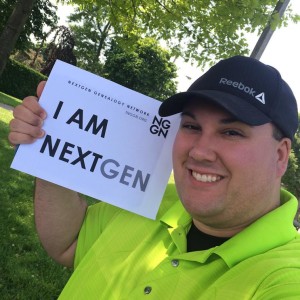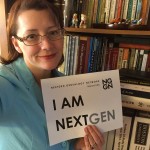Tag: young professionals
Faces of NextGen: Meet Mike Quackenbush
January 4, 2016
 Mike Quackenbush, 25, Canada
Mike Quackenbush, 25, Canada
What five words would you use to describe yourself? Ambitious, Charismatic, Giving, Sociable, Individualistic.
Why genealogy? When you’re born with the curiosity bug, what better than directing that into an activity that really never ends! I was eleven years old when I received a family history on my mother’s family which was prepared by my great-aunt. That book most certainly got my interest piqued! After a few years of delving into further research of the lives on my maternal family, I began to get even more curious of my father’s family. My dad never really knew his father growing up, which in turn left a generational gap of information not being passed down. Almost fifteen years later—I am so excited to share what I have found in my research with family and friends and connect with cousins all around the world!
What’s the coolest discovery you’ve made? Definitely finding out that my 2x great grandfather was imprisoned at HMP Wakefield in Yorkshire, England—not once, but sixteen times in twelve years – was a WOW moment for me! Following his medically unfit (nowadays referred to as PTSD) discharge from his twenty year career with the British Army, he was jailed for not providing for his family—keeping in mind that he literally just got booted from his job. After serving his first sentence, he was jailed fifteen more times in eleven years for reasons including: not providing for his family, begging for money, being homeless, and carrying unpaid civil debts. Putting the whole picture together really made me feel for this man whose life was turned upside down after putting his life on the line to fight numerous battles including the Boer Wars.
What are you working on this week? Following a presentation I made mid-November on British Home Children, I realized that I wanted to learn more about the 118 Middlemore Home Children who traveled on the same ship alongside my great-grandfather in 1913. So this week, I’ve been starting to gather the project framework to begin the multi-year process of researching all of the home children on the passenger list, so that I can then dedicate a database to these 118 children who left their families and roots behind in Great Britain to serve as indentured labour on farms in Canada.
What’s the number one secret to your success in genealogy? Organization. We handle a lot of files, both paper and digital, and you need to develop your own system for filing and managing data. Some people get data-overload—I crave it. Names, dates, places—I feel like I have an eidetic memory for these, which helps immensely when parsing through records and making connections.
What superpower would you want to help you uncover your family history? I think every genealogist on the face of the earth would say, at some point, that time travel would be an incredible super power to have. Just imagine.
What are we most likely to find you doing when you’re not researching family history? When I’m not researching family history, I first love to catch up on the sleep I’ve missed from those late-night binge research sessions in new databases online! After I’ve reenergized, I love to travel, spend time with friends, try new wine selections, and maybe sneak in some movies—or binge watch Netflix!
Anything else you’d like to share? Make yourself a New Year’s resolution you can actually keep and achieve for 2016! Simply get involved. A few minutes a day can help you to become part of a larger community, and help people around the world. As the great leadership speaker Zig Ziglar once said, “You can have everything in life you want, if you will just help enough other people get what they want.”
The NextGen Genealogy Network is made up of young genealogists with diverse backgrounds, interests, and experiences. Faces of NextGen showcases a different member of our community each month. If you would like to be considered for an upcoming feature, simply complete our questionnaire and submit a selfie.
Facebook Groups for Genealogists
December 14, 2015
Facebook is one of the leading social media platforms that genealogists use to research their family history and find living relatives. In this post, we’re going to discuss some key ways to leverage Facebook for genealogy with a focus on Facebook Groups, including how to use them to your advantage and how to create your own.
There are thousands of Facebook Groups that include nearly every topic imaginable. In the genealogy community in particular, there are five primary types of groups that you can join to further your research:
- General Genealogy Groups: Ask questions about your research problems, request assistance finding a specific record, and share your discoveries.
- Location Specific Genealogy Groups: These are directed towards those focusing on research in a specific geographic area, perhaps a country, a state/province, or even down to a county level.
- Surname Registry Groups: These are centered around locating relatives who share the same surname within a region in hopes of connecting with other living descendants. Maybe you’ll find those elusive fourth cousins!
- Genetic Genealogy Groups: Come here if you are interested in the nitty-gritty of your DNA results, including using DNA to locate living relatives. Users are often encouraged to upload their DNA results on GEDmatch and to share kit numbers in the group to help connect members with each other.
- Organization/Society Groups: These allow an existing organization or genealogical society to keep in touch with members and offer a place for virtual discussion. Did you know that the NextGen Genealogy Network has a Facebook Group?
If you have pored through the wide variety of genealogy groups on Facebook and haven’t found one that suits your needs, consider starting your own. For example, if your ancestor’s county doesn’t have it’s own genealogy group, or if you want to start a small group for your extended relatives to share family photographs and stories, read on.

Creating your own Facebook Group is simple:
- At the top of your Facebook homepage you will see a padlock. Click the arrow next to it and select “Create Group.”
- Give your new Facebook Group a name, keeping in mind it should be something descriptive to make it easy for people to find (if you want it to be open to receiving new members).
- Add new members, whether this may be your genealogy best friend or your cousins who are interested in participating. I recommend that you check with any prospective members first before sending an invitation to your group to ensure that your invitation is not an annoyance or simply ignored.
- Be aware of privacy settings that determine who can see the group and who can join the group.
- Public: Anyone can join and anyone can see the group’s posts (even if they’re not members). Use with caution.
- Closed: Members must request to join. This helps to screen out trolls, group collectors, self-promoters, etc. Depending on the volume of member requests, you may want to have a backup admin to assist you with this process. Only members can see posts.
- Secret: Not open to the public. Only members can see posts and refer new members to join the group by invitation.
- Add your Facebook Group to your favorites. This will put your group on the toolbar on the left side of your Facebook homepage so you can easily access the group to monitor posts, pose discussion questions, or approve new members. Make an effort to keep your group active and engaged for the greatest genealogical success!
How are you using Facebook Groups to further your research?
 Melanie McComb, a software product analyst, volunteers as the NextGen Genealogy Network’s Social Media Assistant. She is also the creator and co-administrator of the English Surname Registry Facebook Group. She has been researching her family history for over five years and can often be found online on Facebook assisting others with their research.
Melanie McComb, a software product analyst, volunteers as the NextGen Genealogy Network’s Social Media Assistant. She is also the creator and co-administrator of the English Surname Registry Facebook Group. She has been researching her family history for over five years and can often be found online on Facebook assisting others with their research.
Faces of NextGen: Meet Lisa Chan
December 1, 2015
 Lisa Chan, 40, Washington
Lisa Chan, 40, Washington
What five words would you use to describe yourself? Curious. Independent. Dog lover. Transgendered. Musical.
Why genealogy? I love solving puzzles, a good mystery, the natural world, genetics, history, photography, anthropology, migration stories, and social and civil justice. Genealogy has it all!
What’s the coolest discovery you’ve made? Just one?
A fourth great grand uncle was the reason an entire village in Niedersachsen, Germany practically emptied due to a mass migration to Illinois inspired by his letter home. It had been copied 1,500 times and then distributed far and wide. Hundreds of Ostfriesen families got their good start in Illinois based on his detailed instructions for success.
With the help of genetic genealogy and segment analysis, I was able to solve a 7 decade-old brick wall and reconnect more than twenty curious descendants and project participants to colonial roots in Maryland in the 1700s.
After participating in a DNA test for a medical study, I discovered that I am the non-paternity-event in my generation. With the help of genetic genealogy and caring “Search Angels,” I have been reconnected with my paternal family. We are excited to get to know one another. It turns out my NEW GRANNY is a genealogy nut too.
What are you working on this week? I just discovered a cluster of shared segments associated with lots of recent Irish surnames and locations. It’s exciting because my admixture reports suggest a decent portion of Irish descent, but the only known Irish patriarch was from the late 1700s.
What’s the number one secret to your success in genealogy? Sleep on it.
What superpower would you want to help you uncover your family history? Time travel, of course!
What are we most likely to find you doing when you’re not researching family history? Playing the drums or walking our dogs. I love percussion and engage in music therapy to address a wide variety of emotional and physical health needs. Did you know that doing anything percussive helps to regulate digestion?! Feeling anxious? Sing a song and clap your hands. Can’t sleep? Forget counting sheep, count measures instead.
Anything else you’d like to share? I’d love to see the disregard for adoptees and persons with unknown paternity decreased in the genealogical community overall. We’re the fastest growing demographic in genealogy today. We comprise the majority of young genealogists entering the hobby. We spend a lot of money – testing at each of the big three and purchasing genetic genealogy workshops. We are eager to help others with triangulation projects, are generous with what we do know, and our motivation to get to the truth is unparalleled. It would be really great if we had more allies among the full-tree’d who could advocate for embracing us.
The NextGen Genealogy Network is made up of young genealogists with diverse backgrounds, interests, and experiences. Faces of NextGen will showcase a different member of our community each month. If you would like to be considered for an upcoming feature, simply complete our questionnaire and submit a selfie.


